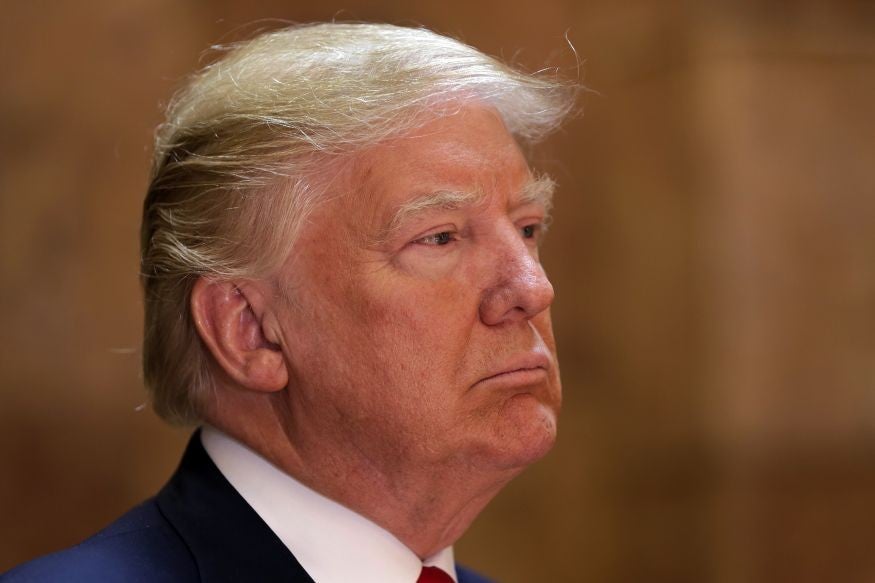Donald Trump is re-writing the Republican rule book
Until now Republican nominations have been secured on the basis of what amounts to Buggins’ turn. No longer

Your support helps us to tell the story
From reproductive rights to climate change to Big Tech, The Independent is on the ground when the story is developing. Whether it's investigating the financials of Elon Musk's pro-Trump PAC or producing our latest documentary, 'The A Word', which shines a light on the American women fighting for reproductive rights, we know how important it is to parse out the facts from the messaging.
At such a critical moment in US history, we need reporters on the ground. Your donation allows us to keep sending journalists to speak to both sides of the story.
The Independent is trusted by Americans across the entire political spectrum. And unlike many other quality news outlets, we choose not to lock Americans out of our reporting and analysis with paywalls. We believe quality journalism should be available to everyone, paid for by those who can afford it.
Your support makes all the difference.After his five-state East Coast sweep on Tuesday, it now looks all but certain that Donald Trump, the brash and policy-lite Manhattan property magnate with no previous political experience, will secure the Republican Party’s presidential nomination for an expected November showdown with Hillary Clinton.
Mr Trump’s thrashing by Ted Cruz in Wisconsin’s primary earlier this month is now forgotten. The non-aggression pact between his two remaining challengers, Senator Cruz and Governor John Kasich of Ohio – designed to prevent him obtaining the 1,237 delegates he needs to win on the first ballot at Cleveland – seems doomed to failure. Either Mr Trump will hit the required number beforehand, or he will be so close that the nomination cannot reasonably be denied him. And whatever happens, he is rewriting the rule book of American presidential politics.
Until now Republican nominations have been secured on the basis of what amounts to Buggins’ turn. The prize has gone not to a populist upstart, but to an obvious heir-apparent, be it George H.W. Bush in 1988, Bob Dole in 1996, John McCain in 2008, and Mitt Romney in 2012. No longer. Non-politicians once used to run for president, but only Dwight Eisenhower has pulled it off in modern times. And he was a military hero of immense national and international prestige, something Mr Trump most certainly cannot boast. Of the two other notable recent ‘outsiders’ who were their party’s nominees, Jimmy Carter was in fact a former governor and Barry Goldwater a sitting Senator.
Mr Trump is a mould-breaker. Whether he is a Republican at all is a matter of debate, but he has effectively hijacked the party. He has exposed its traditional establishment as an emperor with no clothes: discredited and utterly out of touch with the party’s grass roots and less affluent supporters, whose economic interests it has ignored. This large segment of the electorate provides the bulk of his support. Relentless optimism is the usual keynote of presidential campaigns. Mr Trump is prevailing by declaring the country to be an enfeebled mess, and playing not to the aspirations of voters but to their grievances.
In doing so he could redraw the US presidential map. The conventional wisdom was that given America’s changing demographics, Republicans would have to boost their appeal to women, blacks and Hispanics, or be locked out of the Oval Office for years. Mr Trump has turned that theory on its head, seemingly going out of his way to offend those constituencies. Instead he is drawing in predominantly white voters, blue collar and middle class Americans who have fallen on hard times, many of whom – it is clear – were previously Democrats.
This raises the possibility that old industrial states like Pennsylvania, Michigan and Wisconsin, for decades bankers for the Democrats, could switch sides. Meanwhile, Republican strongholds like Arizona (and who knows, maybe even Texas?) which have large Latino minorities, could go the other way.
Whether these changes take place, and just how lasting is the Trump phenomenon, will be determined by what happens in November. From the inception of the 20th century, no populist has been elected president, and current polls suggest that in a match-up with Ms Clinton he would be badly beaten. In which case, the Republican party might revert to its old ways. A Trump victory, however, would rewrite the rules for good.
Join our commenting forum
Join thought-provoking conversations, follow other Independent readers and see their replies
Comments